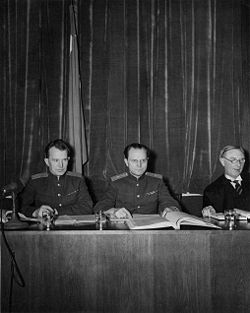- Iona Nikitchenko
-
 Soviet judges at Nuremberg, left to right: Alexander Volchkov, Iona Nikitchenko. British judge, Norman Birkett sat at extreme right.
Soviet judges at Nuremberg, left to right: Alexander Volchkov, Iona Nikitchenko. British judge, Norman Birkett sat at extreme right.
Major-General Iona Timofeevich Nikitchenko (Russian: Иона Тимофеевич Никитченко) (June 28, 1895, Don Voisko Oblast, Russian Empire – April 22, 1967, Moscow, Russian SFSR) was a judge of the Supreme Court of the Soviet Union.
Iona was born to a peasant family in khutor Tuzlukov (now Rostov Oblast). He studied at his local Agricultural Institute and from 1916 was a Bolshevik. His court experience started in May 1920 when he was appointed as the chairman-deputy of the Military Court of Semirechye Army Group during the Civil War. During the Civil War he participated on the frontlines in the Middle Asia. In 1924 was appointed as the member of the Military Court Collegiate of the Moscow Military District.
Nikitchenko presided over some of the most notorious of Joseph Stalin's show trials during the Great Purges of 1936 to 1938, where he among other things sentenced Kamenev and Zinoviev.[1]
Nuremberg Trial
Nikitchenko was one of the three main drafters of the London Charter. He was also the Soviet Union's judge at the Nuremberg trials, and was President for the session at Berlin. Nikitchenko's prejudices were evident from the outset. Before the Tribunal convened, Nikitchenko explained the Soviet perspective of the trials:
"We are dealing here with the chief war criminals who have already been convicted and whose conviction has been already announced by both the Moscow and Crimea [Yalta] declarations by the heads of the [Allied] governments.... The whole idea is to secure quick and just punishment for the crime."[2]
His statements in this respect call to mind the statements of US Supreme Court Chief Justice Harlan Fiske Stone who wrote "Chief US prosecutor Jackson is away conducting his high-grade lynching party in Nuremberg, I don't mind what he does to the Nazis, but I hate to see the pretense that he is running a court and proceeding according to common law. This is a little too sanctimonious a fraud to meet my old-fashioned ideas." Nikitchenko was thus far from alone in viewing the Nuremberg trials as a farcical cloaking in law of the process of putting to death a large number of notorious villains.
Nikitchenko dissented against the three acquittals and argued for a death sentence for Rudolf Hess. Nikitchenko said, in the lead-up to the trials, "If... the judge is supposed to be impartial, it would only lead to unnecessary delays." Hess, formerly Hitler's deputy fuhrer, the man charged by Hitler with implementing Nazi Germany's Nuremberg laws, the man who signed the decree establishing the notorious German occupation government of Poland, and since May 1941 in a British Prison, was sentenced to life in prison by the tribunal. In this respect, he was by far the most senior surviving Nazi official to escape a death sentence.
Nikitchecko feared a compromise on too lenient a level. At the point of final deliberation he reexamined Hess' case and voted for a life sentence so that the opportunity for Hess to get away with a lesser degree of punishment did not occur.He ended up on a farm in his hometown.
References
- ^ Encyclopedia Krugosvet (Russian)
- ^ on June 29, 1945 (8. Report of Robert Jackson, United States Representative to the International Conference on Military Trials, London, 1945 (Washington, DC: US State Dept., 1949), pp. 104-106, 303.; Whitney R. Harris, Tyranny on Trial: The Evidence at Nuremberg (Dallas: S.M.U. Press, 1954), pp. 16-17.)
Judges of the International Military Tribunal at Nuremberg 
Geoffrey Lawrence (president) Norman Birkett (alternative) 

Francis Biddle (judge) John Parker (alternative) 

Henri de Vabres (judge) Robert Falco (alternative) 

Iona Nikitchenko (judge) Alexander Volchkov (alternative)  Categories:
Categories:- 1895 births
- 1967 deaths
- Soviet people of World War II
- Soviet jurists
Wikimedia Foundation. 2010.
